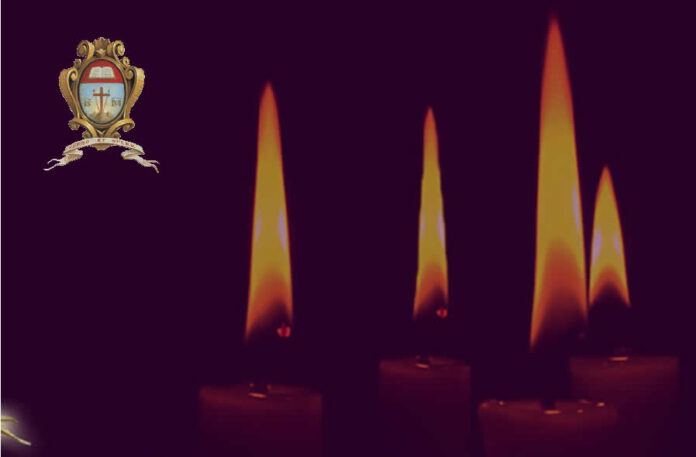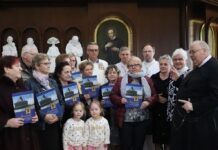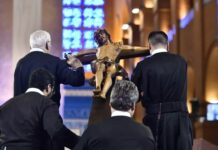Introduction
Advent is a powerful time in the life of the Church. Advent is for the disciples of Jesus a time of preparation for the coming of the Lord. And preparing for the coming of the Lord means looking at our life and desiring to synchronise it better with the Gospel. This effort to synchronise our lifestyle with the Gospel of Jesus, is called CONVERSION.
Living the call to conversion does not mean changing completely at all. Living the call to conversion means allowing God to come into our lives. I believe that we must somehow free ourselves from the temptation to say, we must be other than who we are. We must be deeply ourselves. But we must let God in “as we are”: we must let God into that character that we have; we must let God into our past and into the history that we live. When God enters into our life, whatever we are, WE SHINE. If God enters into the little that I am, I can shine!
For the coming Advent, I would like to offer you four testimonies of characters from the Bible, who can help us to live Advent well, to let Jesus into our lives: 1. John the Baptist; 2. Elizabeth and Zechariah; 3. Anna; 4. Joseph.
1. John the Baptist
The first biblical Advent figure, who helps us to live the Advent season well, i.e., to prepare us for the coming of the Lord is John the Baptist.
- The Desert – rediscovering the value of what is essential to life.
John chooses a place far from the city for his activity, he chooses the desert. This is what the evangelist Matthew reports:
“In those days John the Baptist came and preached in the desert of Judea saying, “Repent, for the kingdom of heaven is at hand!” (…) And he, John, wore a suit of camel’s hair and a leather belt around his hips; his food was locusts and wild honey. His food was locusts and wild honey” (Mt 3:1-4).
In the desert, John led a simple and austere lifestyle. The Gospel of Matthew emphasises the poverty of the Baptist’s clothing as much as his poor diet. The truth is that “in the desert one rediscovers the value of what is truly essential, and what is truly necessary for life.” This truth was reminded to the whole Church by Benedict XVI, nearly ten years ago, at the beginning of the Year of Faith.[1] And if you remember, Benedict XVI spoke of the sad phenomenon: “In recent decades a way of life has increased, a world without God. Unfortunately, every day around us we see the emptiness that has spread because of ‘spiritual desertification.”
In the desert, one rediscovers the value of what is essential for living. And in the desert there is especially a need for people of faith who, with their very lives, lives transformed by God, show the way to hope, to God.
It seems to me, that this characterisation of John the Baptist can already be an indication, a help for us in our desire and effort to synchronise ourselves better with the demands of the Gospel. It would be worth asking ourselves:
Am I really only taking what is necessary for my life?
And what style do I propose in relation to the things I possess and that the community allows me to acquire?
Am I a witness of a simple lifestyle?
1.2. A man of God who awakens in others the desire for God
In the history of Israel, the desert became a place of encounter with God, the place
of God’s saving intervention, let us say – the place of God’s revelation. We have no doubt that John in choosing the desert chooses to be with God. The desert, even for him, became a place, an experience of God, a personal encounter with God. As proof of this, we recall the testimony of the evangelist John. Exactly in chapter 1 of this Gospel, John the Baptist recounts his own experience of God: “First I did not know Him, but He who sent me to baptise with water said to me: He on whom you will see the Spirit descend and rest is He, who baptises with the Holy Spirit”. I have seen him and bear witness that he is the Son of God” (John 3:31-34).
Þ God came into John’s life
Þ God spoke to John.
Þ God entrusted him with a mission
Þ and God made John a light and a beacon for others.
God made John his VOICE – or more correctly – John made himself available to God and gave God his VOICE!
And returning to the testimony of Matthew’s Gospel, we see John fulfilling the mission received from God. “John the Baptist preached in the desert of Judea saying, ‘Repent, for the kingdom of heaven is at hand!‘” (Mt 3:2). John preaches
calling people to conversion and baptism. And John’s preaching is anything but spectacular. John’s sermon is
· a simple call to a change of life,
· to conversion,
· a call to break with evil.
And John’s preaching is not accompanied by any miracles. The only miracle of which we learn is that a crowd flocks to John, people flock to him by the waters of the Jordan. John was able to reach the hearts of the people. He succeeded in arousing in them the desire for God.
Why were the crowds attracted to John? What drove them to go to him and confess their sins? Here it is good to recall the story of his birth, or rather the story of his parents Zechariah and Elizabeth. I wonder, what was talked about in this house, what words were spoken in this house? Certainly, Zechariah and Elisabeth, who asked God for the miracle of an offspring, the miracle of parenthood, spoke of God’s greatness, spoke of God’s beauty, spoke of God’s goodness, which they experienced when their son was born! And when John was an adult, he fled into the wilderness to be with this good God.
What attracted people to come to John in the desert? They saw in him a high standard of a man of God, a man who is in touch with God, a man for whom God is everything.
I would like to quote from the introduction to John Paul II’s encyclical Vita Consacrata, the document describing consecrated life and its mission in the Church and world:
“Down the centuries there has never been a shortage of men and women who, docile to the call of the Father and to the motion of the Spirit (…) have left everything, like the Apostles, to be with Jesus and put themselves, like Jesus, at the service of God and their brothers and sisters”. “In fact, “the religious state […] manifests the elevation of the Kingdom of God above all earthly things” (VC, n. 20).
“What we need above all, at this moment in history, are men who, through an enlightened and lived faith, make God credible in this world. The negative testimony of Christians who spoke of God and lived against Him has darkened the image of God and opened the door to unbelief. We need men who keep their gaze straight at God, learning true humanity from there. (…) Only through men who are touched by God, God can return to men”[2]
And here we could ask the second question in relation to our desire to better attune our lifestyle to the Gospel of Jesus.
Þ In me, in my choices, in my daily lifestyle, my brothers and the people who come into contact with me can encounter a man, a religious, a confrere who is in contact with God, who manifests the closeness of God and his goodness, a redeemer for whom God is everything?
Þ Does my relationship, my connection with God, awaken in others a desire for God?
1.3. Two specific appeals[3]
The evangelist Luke mentions the specific appeals of John’s preaching, the concrete indications that we can use for our personal conversion in the season of Advent. Luke writes: “The voice of one crying out in the wilderness: Prepare the way of the Lord, straighten his paths! Every ravine will be filled, every mountain and every hill will be lowered; the crooked paths will become straight and those impassable, levelled” (Lk 3:4-5).
- “Straighten the paths” – practise being simple people.
The first thing John the Baptist says is that to prepare the way of the Lord we must “make straight the paths”. People who have an intense spiritual life tend to be simple, and tend to simplify complex things.
The example of a complicated person meeting Jesus is found in the Gospel of John (Jn 5:1-9). One day Jesus goes to an area of Jerusalem where there was the pool of Bethsaida. The Jews were convinced, that when the water was stirred, only the first person who entered the water received the grace of being healed. So, this pool was surrounded by so many sick people, who were almost in a sort of competition to enter the water first as soon as the angel had stirred the water. Jesus approached a particular sick person who had been stuck, paralysed on a cot for 38 years. Jesus approaches this man and asks him a simple question. He tells him ‘Do you wish to be healed’?
The simple answer to this question would have been “yes!”. Instead, the man does not answer “yes”. He says “nobody picks me up; nobody dives into the pool when the water gets rough; someone else goes down before me”. Instead of answering with a simple “yes, I want to get well”, he blames someone else. He starts to give responsibility to the right and left, he starts to do an analysis of the situation. This is the example of a complicated person. This man must first recover SIMPLICITY. Jesus must first of all change his way of reasoning, he must simplify his heart. Jesus heals him, without letting him enter the water.
John the Baptist gives us the first concrete indication to prepare the way of the Lord, to welcome Jesus. The first thing we must do is to try to be simple people. The way of simplicity, make our heart empty, and prepare ourselves to be able to welcome the Lord.
How can this simplicity be recovered? The confreres we have beside us, these relationships are the place where we can improve in our spiritual life. If we can do this with the confreres, we have beside us – the Lord can come. But if we do not, the Lord cannot come, it is too complicated, it is a labyrinth.
- “Every mountain and hill lowered” = to lower our pride
John also addresses the call to “lower the mountains”. What are the mountains, of which he speaks? Our spiritual life has a specific name for these mountains: he calls it “pride”. And what is pride? Pride is our “I” that fills everything. It fills everything up to the point where there is no room for Jesus. If you want to let Jesus in, you must diminish your “I”, diminish pride. And pride does not want to let go, to give up whatever are our fixations.
In the Old Testament, there is the particular story of Naaman, a great and famous Aramean general. Naaman experiences a kind of conflict, because he wears shining armour, a fame that everyone recognises, but he is leprous. Beneath the armour is a sick body. The prophet Elisha gives Naaman a lesson in conversion. Elisha does not leave his house when the great general arrives, but sends one of his servants to tell him: “Go down to the river Jordan, wash seven times and then all will be well. You may return home‘. Outraged Naaman decides to leave. But one of the servants’ reasons with him, saying: “But if he had asked you for a heroic deed, would you have done it? Absolutely! What does it cost you to do a simple thing?“. That servant invited Naaman to be humble. Naaman had to strip off his armour in order to enter into the water. We have Jesus’ gesture, the Lord’s kenosis, the undressing, the being humble. And the flesh of the great general became like that of a child.
Without humility, one cannot accept Jesus. And true humility is letting oneself be stripped. Letting ourselves be stripped sometimes by others, by the situations we experience. Humility is letting life make us humble. True humility is learning to yield. Humility is accepting everything as if it came from the hand of God!
Þ One day you are much loved, that’s fine.
Þ One day you are misunderstood, welcome that too.
Þ One day you are on trial, welcome the trial.
Þ Another time you are in consolation, welcome the consolation.
Our path must be to not want to be in control of everything, because that is pride. The most important characteristic of humility is to surrender to the Lord, it is to entrust oneself to Him: ‘Lord if You want it, I want it too’.
John the Baptist, the first biblical figure who helps us to live this period of Advent well, that is, to prepare us for the coming of the Lord, proposes to us in a concrete way to:
(1.) Rediscover the value of what is essential for life.
(2.) To be a religious who is in continuous contact with God.
(3.) Learn to practise being simple people.
(4.) To diminish our pride by accepting to live more humbly.
(5.) Accepting everything as coming from the hands of God.
Fr. Krzysztof Bielinski, C.SS.R.,
Alphonsian Academy
Original in Italian
Translated by Joseph Ivel Mendanha, C.SS.R.
[1] Started on 11 October 2012, on the 50th anniversary of the opening of the Second Vatican Council, and ended
on the Solemnity of Our Lord Jesus Christ, King of the Universe, on 24 November 2013.
[2] J. RATZINGER/BENEDICT XVI, ‘Europe in the Crisis of Cultures’, in: P. Azzaro – C. Granados (eds.), The True Europe. Identity and Mission, 235-247, here 246-247.
[3] I have used here the lecture by DON LUIGI MARIA EPICOCO, “Prepare the way of the Lord, straighten his paths”, St Pius Peruggia Church 3.12.2022, in https://www.youtube.com/watch v=f_82HxQhytc&themeRefresh=1





